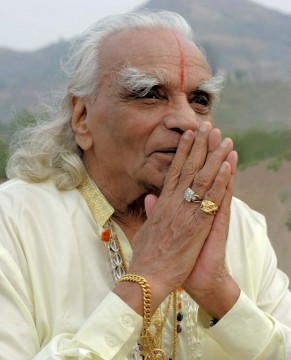The world has recently lost two bearers of light—actor Robin Williams, age 63, and yoga master B.K.S. Iyengar, age 95. Both men dedicated their lives to raising the level of joy in the world – their lives, deaths, and lasting effect on the world reflect that. But they did it differently.
Robin Williams brought us laughter, a way to cope with our disappointments, as well as to survive his own. But outside of public appearance, he sadly did not have a way to seize and find joy in the day. Iyengar offered not only himself, but the world, a way to face our most difficult days.
Solace in a Role 
We all have ways of self-medicating—soothing ourselves when the anxiety becomes intolerable, or simply bringing balance to a system that has become imbalanced. According to what we’ve been reading in the media, Robin Williams self-medicated with substances that numbed the pain of living in his world. But his healthier self-medication was the art of performing. In the moments when he could see himself reflected in the happiness he brought to others, when he was totally absorbed in the role he was playing, he was immune to the darker patterns of his thoughts and beliefs. And as his audience, we too could forget our bleak moods or our victim story in the moments he entertained us. When we laughed with him or at his antics, we were enraptured in moments of joy that no grief or shame could penetrate. But when the performance was over, boom. He was back in his own dark spiral of thoughts and emotions. And so were we.
Mind-Body Balance
The yoga practice that Mr. Iyengar introduced to the West showed us another way out of our pain, a way to self-medicate that did not end when the laughter died off. He showed us that by clearing our inner space physically, emotionally and mentally through a yoga practice, we could begin to sustain balance in our lives. Yoga is not a panacea for pain, but current research is showing its beneficial effect on mood and all manner of debilitating conditions. Yoga, especially a practice that includes attention to sensation and breath, teaches us how to live with what is arising, even when it’s painful.
Mr. Iyengar died at 95. Although I was never his student, I did study with several teachers who were. And I had the great privilege of sitting on stage with him at a conference in India when he was 92, where he spoke with a thrilling vitality and an astonishing compassion for his younger self.
Whether we practice Iyengar Yoga or our practice is culled from other traditions or schools, we offer gratitude to Mr. Iyengar, who, through his commitment to teach fine teachers, offered us a way to find and sustain the joy through our daily practice. And we offer gratitude to Robin Williams who not only made us laugh but has also shone light on the devastating effects of depression. May more people seek treatment for their depression and may that treatment include yoga.
For LifeForce Yoga practices to cope with depression and anxiety, click here.
To find a LifeForce Yoga Practitioner in your area click here.
Thank you for this article, Amy. Since Robin Williams committed suicide I have been struggling. It is funny how someone I do not know could have had such an effect on me.
Your writing helps me find a perspective that works. Thank you, thank you
Namaste, love, love love. And great joy for you with your daughter and granddaughter.
Judy
Judy,
I’m gratified that my thoughts have helped you. Thank you for your kind words about my family!
a loving namaste,
Amy